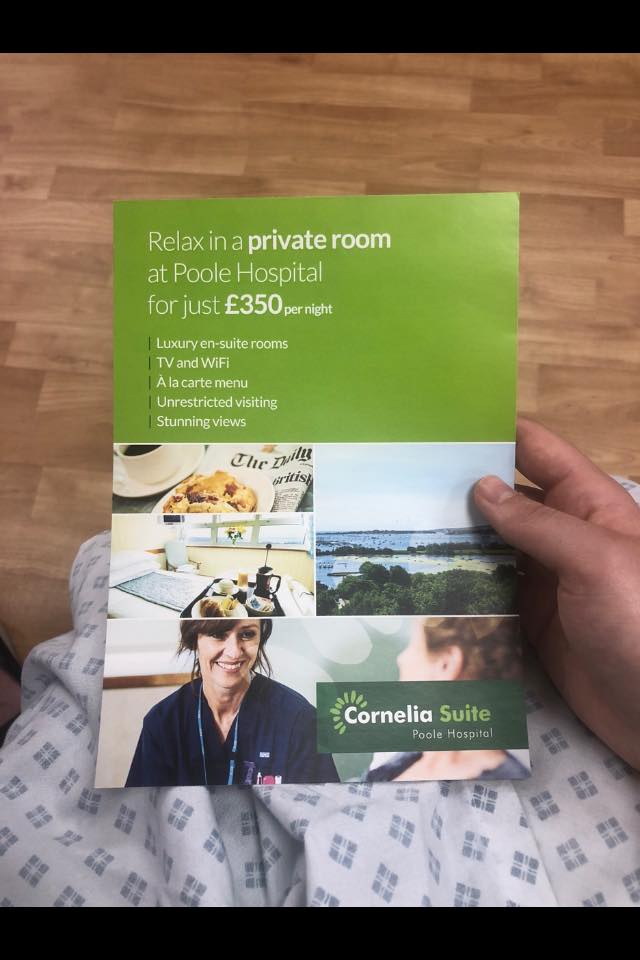HELP SAVE POOLE A&E and MATERNITY FOR XMAS 2018
The CCG has looked at the issue of patient safety with ‘rose tinted glasses’, which has led to a biased view towards their desired outcome and distracted them from the realities of the difficulty of providing safe, effective care for major treatment patients if, as is proposed, Poole A&E was replaced by an Urgent Care Centre.
Questions are not being asked appropriately, because the CCG are so fixed on their ultimate destination. The CCG needs to listen to the concerns of A&E clinicians, SWAST and patients group to address these issues.
If Poole A&E becomes an Urgent Care Centre, the CCG suggest that 19 minutes will be added onto the journey time for major treatment for Purbeck patients to get to at RBH, and it will be 8 minutes longer to Dorset County, which will not have Major Emergency Hospital services. Even 8 minutes is a long time for a critically ill patient and, quite simply, means the difference between life and death.
There are a range of conditions that cannot be treated in the ambulance where time to hospital treatment is critical, as the patient could die at any moment. It cannot, therefore, be argued with any honesty that longer journey time to access treatment is irrelevant in these cases. The SWAST report corroborates this and identifies many patients whereby longer transfer time could have led to patient deaths or disability.
It may be true that those arriving at a better resourced centre are likely to do better, however this does not address the issue of those who die en route, or for whom treatment has come too late to avoid permanent disability. While it would not be surprising if better resourced departments produced better outcomes, this is an argument for improving services at existing hospitals, not for closing A&E and Maternity Departments.
Looking in more detail at the risk in several time critical conditions:
Strokes require an urgent CT scan to find out if it is appropriate to treat the patient with blood thinning drugs within the 4 hour time frame. An ambulance cannot treat, as they do not know what type of stroke it is. If relatives don’t recognise initially that the patient is having a stroke the ambulance call is already delayed . Once a patient arrive in hospital clinicians have 60 minutes for tests to be completed and analysed and treatment given- ‘door to needle time’.
In a heart attack, every minute delay to treatment will result in loss of heart muscle. In all heart attacks, the sooner the patient receives treatment, the better, as the heart muscle dies with each passing minutes. Hence the saying “minutes mean myocardium”.
Sepsis is a time critical condition administration of antibiotics in a timely manner is crucial, every hour delay in receiving antibiotics results in a 7.6% increase in the risk of mortality. Ambulance crews cannot give antibiotics for sepsis.
Respiratory emergencies need to be sorted out within 3 minutes to improve oxygenation and prevent hypoxic brain injury. In order to effectively ventilate a patient you need to get oxygen in and remove carbon dioxide. If a patient is unconscious or has a breathing problem they can’t ventilate and will require the skills of a paramedic, anaesthetist or A&E doctor. SWAST cannot always provide paramedics to these emergencies and ambulance crews would need to get the patient to the nearest A&E as quickly as possible to save life.
In cardiac arrest the patient may not be susceptible to defibrillation. Out of hospital survival rates for cardiac arrest are very poor – around 8.6%, while in-hospital rates about 20% depending on the many factors that influence outcome. The sooner these patients arrive in A&E the better for their chances of survival.
In major trauma, SWAST may decide the patient needs to go to the Major Trauma Centre at Southampton Hospital. However, the guidance recommends that the patient needs to arrive at the Trauma Centre within 45-60 minutes, which cannot be achieved from most of Dorset. In this incidence the patient would then need to be stabilised at Poole Trauma Unit within 45 minutes, before onward travel to Southampton Trauma Centre.
Unless measures are taken to consider how these time critical conditions would be affected by the CSR plans at this stage, lives will be lost.












